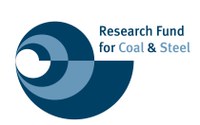Welcome to the Zincobor website
Zincobor is a research project funded by the program RFCS, Research Fund for Coal and Steel of the European Commission. The RFCS supports research projects in coal and steel sectors. These projects cover: production processes; application, utilisation and conversion of resources; safety at work; environmental protection and reducing CO2 emissions from coal use and steel production.
The Project
The increasing demand for light weight car body structures with enhanced safety properties is the main driving factor for the introduction of press hardened components in automotive applications. The desire to use such components with superior mechanical properties in heavy-duty corrosion applications led to the development of zinc-based coatings on high-strength steels in order to provide an active corrosion protection.
Up to the present these coatings exhibit the main drawback of cracks appearing after the direct press hardening regardless the applied coating process with the risk of intolerable crack propagation into the base material. Some presumptions concerning the underlying mechanisms already exist, e.g. a liquid melt assisted cracking in the presence of a Zn-melt and a stress state or a grain boundary embrittlement caused by a corrosive composition of the coating and the possibility of diffusion processes, but the real mechanisms may be even more complex due to superposition of various effects.
Up to now there is a major lack of knowledge about the responsible thermo-chemical, thermo-mechanical and/or high-temperature tribological effects and conditions which are responsible for the crack initiation and its growth. Therefore, the motivation of this project is to deal with such drawbacks and increase the existing knowledge allowing to understand them.
The objective is to explore the mechanisms of crack initiation and propagation, to identify the process parameters responsible for such detrimental effects and develop solutions to prevent it. The information about these phenomena is essential for an optimisation of the coatings, its deposition methods and/or for the design of direct press hardening processes. For this the influence of each step in the process chain will be investigated separately but with consecutively increasing complexity of the responsible mechanisms and interactions by the use of modified test facilities and tests on industrial scale as a final benchmark.
Objectives
The main objectives of the project can be summarised as follows:
- Identification of the responsible thermo-chemical, thermo-mechanical and/or high-temperature tribological phenomena of crack initiation as well as liquid melt embrittlement in Zn-based coatings and the interaction of the different mechanisms.
- Identification of critical press hardening process steps, process parameter combinations and mechanical and environmental conditions for crack growth.
- Identification of different crack types and their effect on critical crack growth.
- Development or adaptation of test equipment enabling to identify complex thermo-chemical, thermo-mechanical and/or high-temperature tribological mechanisms for crack initiation.
- Establishment of unprecedented methods for determining local micro-mechanical properties and residual stresses in coatings by means of instrumented indentation.
- Development and adaptation of characterisation methods to identify different crack types and their impact on critical crack growth under different working conditions.
- Optimisation of press hardening strategies to prevent the detrimental effects of crack initiation and growth in zinc coated components and verification of their feasibility at industrial scale.


